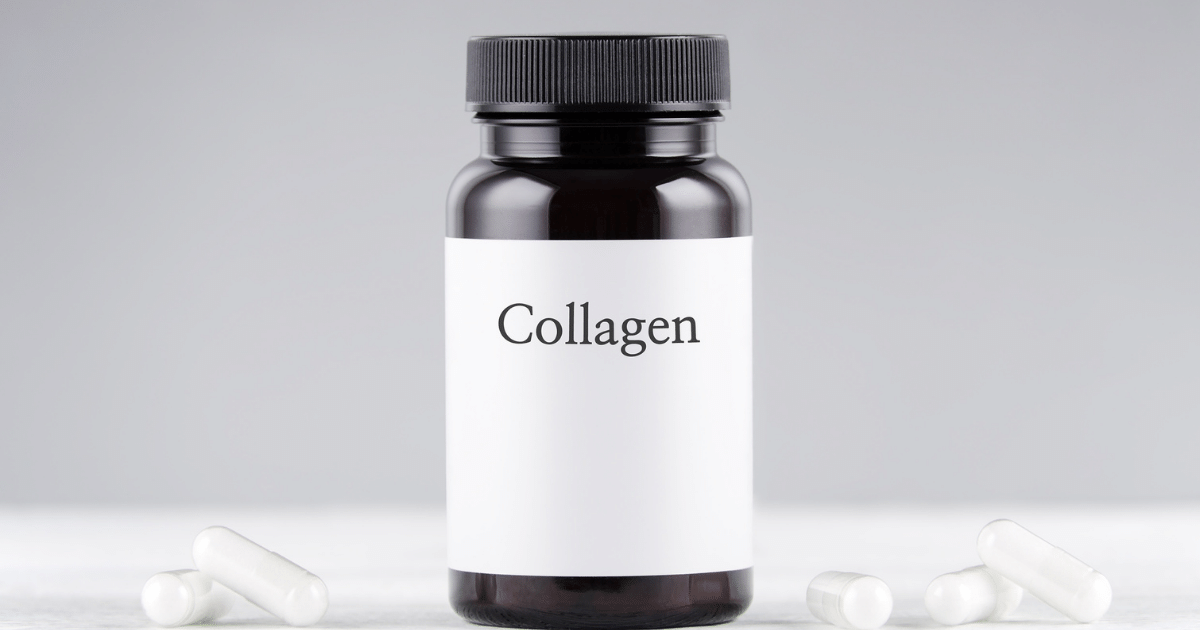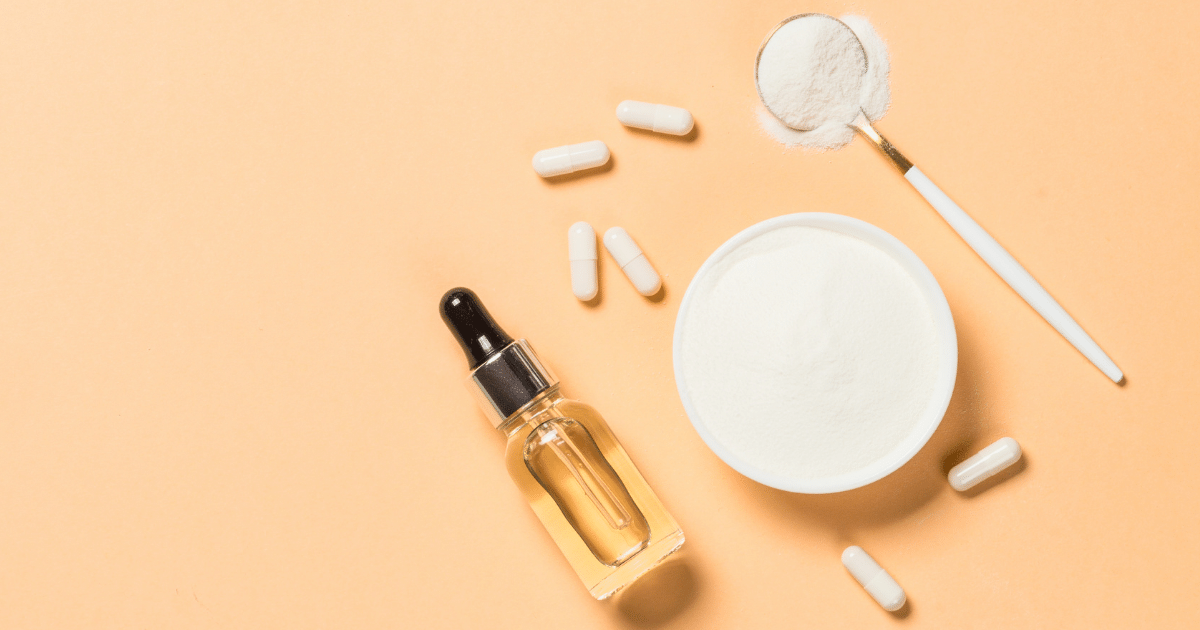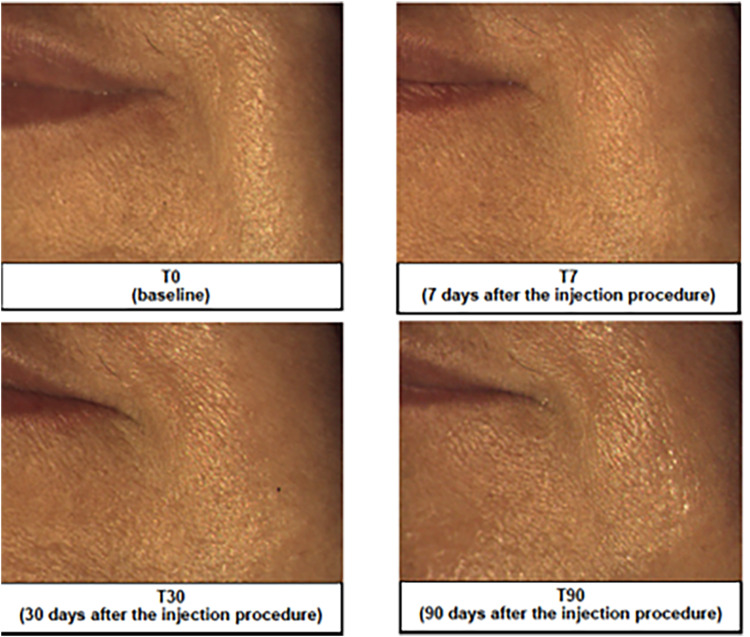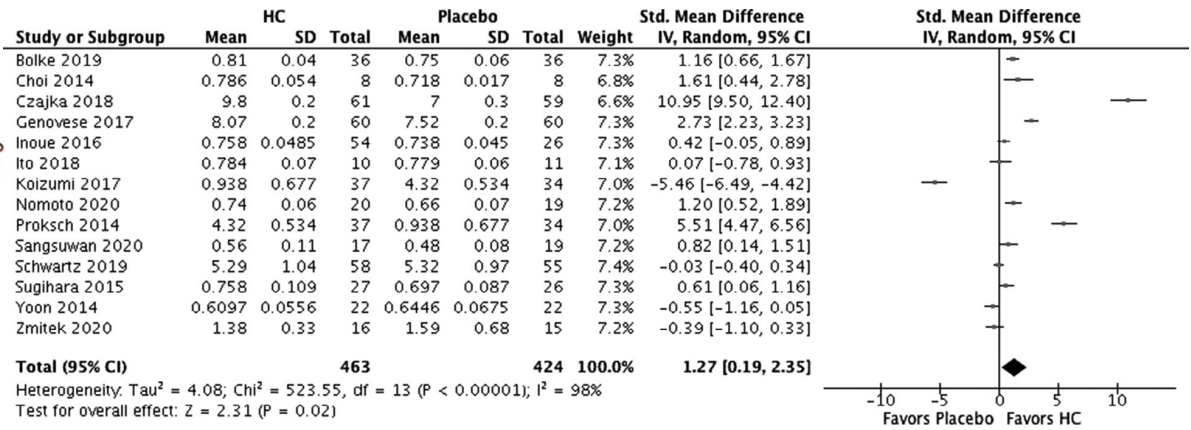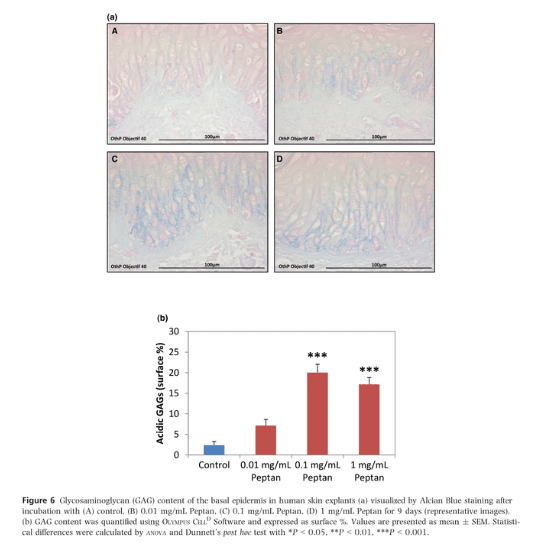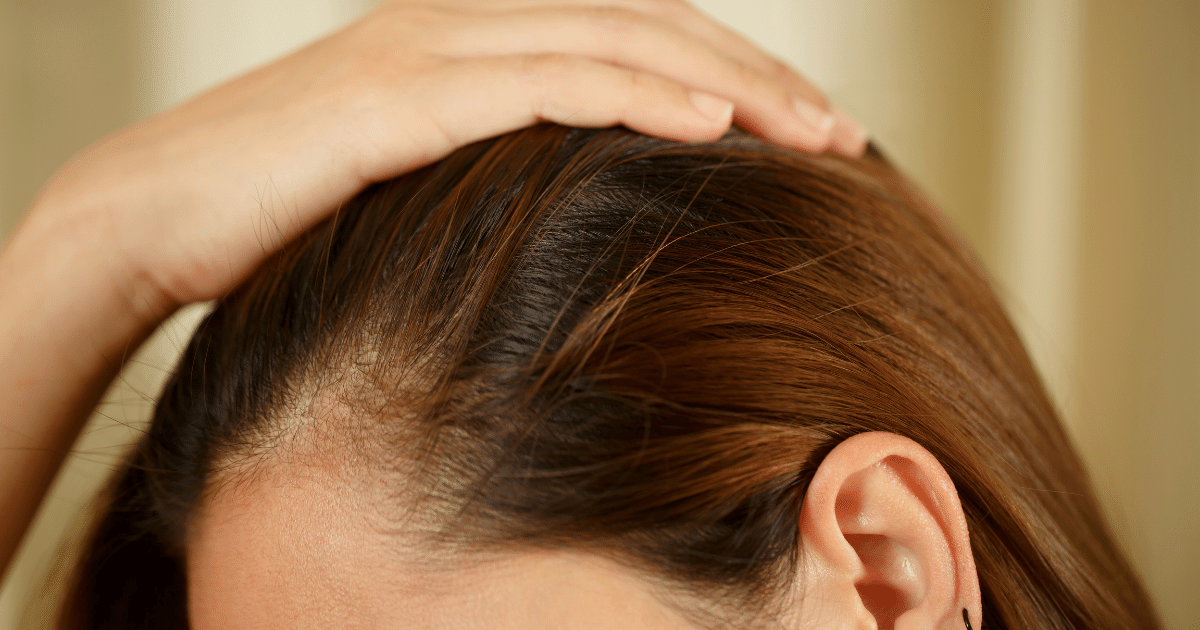Collagen is the most abundant protein in the body. A structural protein, collagen is responsible for giving cells their shape. Collagen acts like scaffolding for our blood vessels, bones, connective tissues and skin. In response to injury, collagen is sent to the wound to rebuild and repair. Collagen keeps our skin from wrinkling, and may even have implications for promoting healthier, thicker hair. But do collagen supplements work to prevent hair from thinning or shedding?
Collagen and Hair
Humans have 28 different types of collagen. The most common is Type I, which provides structure to our skin, organs, connective tissues, and bone. Despite what supplement companies might claim, collagen’s role in hair thickness and growth is a bit complicated.
Hair follicles require collagen for structure. The dermal sheath of a hair follicle is lined with three layers of collagen. During hair’s anagen (growth) phase, this sheath is elongated, while during hair’s telogen (shedding) phase, the sheath shortens.[1]https://www.ncbi.nlm.nih.gov/pmc/articles/PMC2818774/
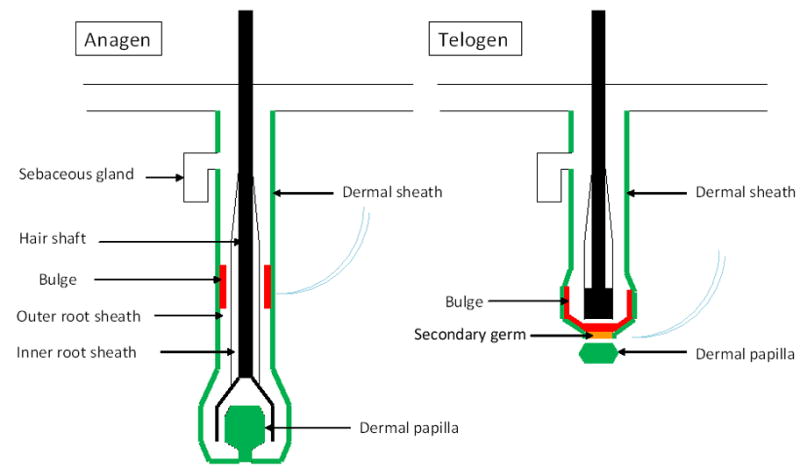
Androgenic alopecia, or male pattern baldness, occurs in part due to a phenomenon called hair follicle miniaturization. This is a process by which hair follicles progressively get smaller until they produce fewer hairs.
While the exact causes of hair follicle miniaturization are still debated, this process is often accompanied by structural changes – particularly to the tissues surrounding these hair follicles. In other words, the dermal sheath (supported by collagen) thins and shortens over time.
So naturally, it makes sense that if we supplement with collagen, our bodies will respond accordingly, the dermal sheath will lengthen, and our hair thickness will improve. But that’s not exactly how it works. More collagen might not necessarily be better.
Collagen & Perifollicular Fibrosis
As the dermal sheath gets shorter, it also gets thicker. Specifically, their collagen bundles are up to 2.5 times larger. (Jaworsky et al., 1992). This extra thickness pushes into the space occupied by adjacent hair follicles, thereby impeding their growth.
As AGA progresses, these dense collagen bundles turn into scar tissue, a condition known as perifollicular fibrosis.
Together, dermal sheath thickening and perifollicular fibrosis restrict the growth of surrounding hair follicles, making it impossible for miniaturizing hair follicles to return to their original size.
Just as some people tend to build up more scar tissue than others, some may be genetically predisposed to perifollicular fibrosis. While dermal sheath thickening is consistently observed in those with AGA, studies find 37-71% of AGA sufferers have at least moderate levels of fibrosis. (Whiting et al., 1996).
In the case of perifollicular fibrosis, lack of collagen is not a problem. Rather, collagen-producing cells are working overtime to build up scar tissue.
When Collagen Declines
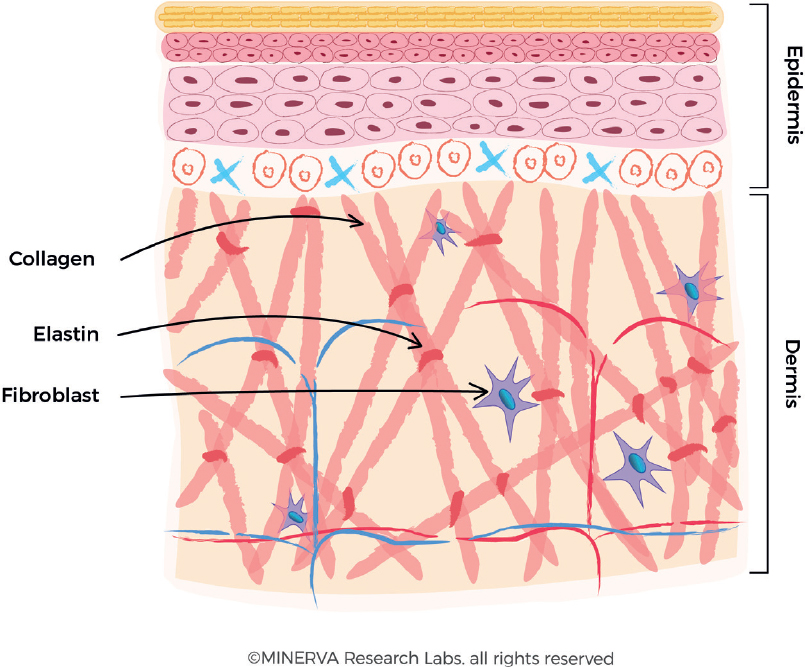
Although collagen is prevalent in the body, it naturally declines with age. Collagen production tends to peak when we are in our late teens to early twenties. From there, a steep drop in the amount of collagen produced occurs until anywhere between 40-60 years of age. No one really knows the true reason why this occurs, but it’s a general feature of aging.
Because collagen has a half life of about 15 years, we don’t notice this gradual structural decay until later in our lifetime – when we accumulate wrinkles and saggy skin. Generally, from early twenties onward, fibroblast production of collagen and other collagen-related proteins like elastin (which keeps our skin plump), drops 1-1.5% per year.[2]https://parjournal.net/article/view/3863
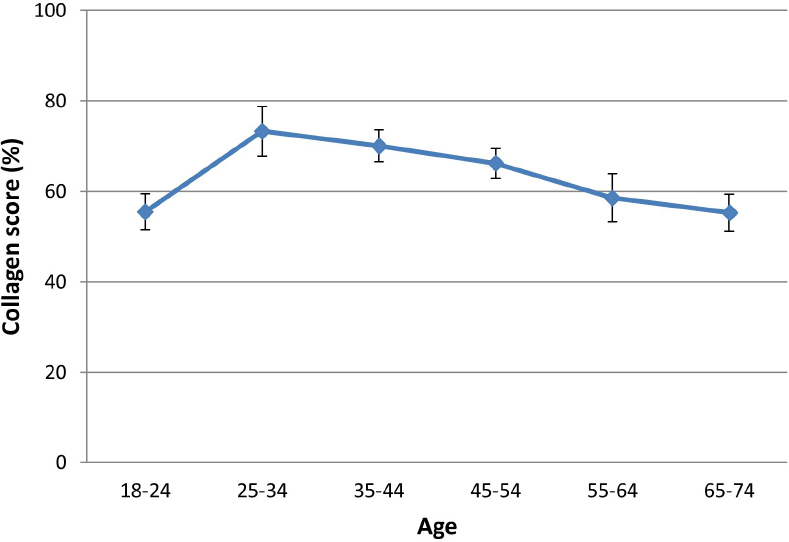
With this loss of collagen, we also lose precious cell signaling, stem cell function (even if they’re still present within the tissue like the hair follicle), and cell-to-cell communication. This, combined with the accumulation of damage to the collagen itself (such as with advanced glycation end products where sugars attach to the collagen), is a feature of many forms of hair loss – most notably, androgenic alopecia and cicatricial alopecia.[3]https://dmsjournal.biomedcentral.com/articles/10.1186/s13098-018-0311-z[4]https://www.ncbi.nlm.nih.gov/pmc/articles/PMC6348462/
Because collagen contributes to the structure and elasticity of the scalp’s dermis, it’s thought that supplementing with collagen could lead to a healthier scalp dermis, and thus less hair thinning. But as we’ll see below, research has yet to demonstrate that this is the case.
About Collagen Supplements
Collagen supplements are promoted for everything from wrinkles, to sagging skin, bone strength, and thicker, healthier hair. They are packaged as gels, creams, pills and protein powders, just to name a few. Supplements are marketed by the type of collagen they contain (Type I, II, III, etc) or as collagen peptides.
Collagen Supplement Types
Beware that the types of collagen fibers don’t follow a strict nomenclature, nor do the Roman numerals (e.g: I, IV, IX), mean anything specifically. Also, there is overlap between many of the different types of collagen fibers.
Most generally, collagen fibers are made up of a triple protein helix.
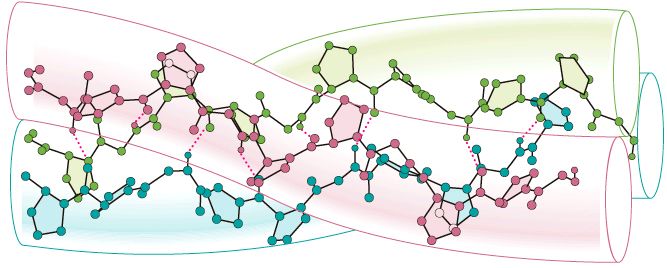
But collagen fibers don’t always have triple helices. This is why various forms of collagen exist in different parts of our bodies. For example, the collagen lining our hair follicles is distinctly different from the collagen coating our gut tissue.
To further throw a wrench into things, even within the same type of collagen (say type III), isoforms exist which are different in function. So, unless a supplement containing type III collagen makes that distinction, it’s unlikely you’re ingesting the exact type of collagen needed for a particular function in your body.
Collagen Peptides
One way many collagen supplements claim to work is by providing your body with amino acids (packaged as collagen) which can then be broken down and reassembled to build the collagen your body needs.
Hair is primarily made of a protein called keratin. Some of the building blocks of this protein are also found in collagen. However, no studies to date have demonstrated that ingesting collagen peptides makes the amino acids within usable in this way.
What Foods Contain Collagen?
Foods which contain collagen are only found in animal products. Plants themselves don’t synthesize collagen. They do however, synthesize vitamin C. And vitamin C is integral to the proper formation of collagen. In fact scurvy, which arises due to lack of vitamin C, is actually a degradation of collagen!
So, when formulating “what are the best foods for improving collagen?” plant foods, fruits and herbs should also be included.
There are over 28 different types of collagen (see table here), so the only way to ingest most of them, as they all play important roles in our bodies, is to consume a variety of foods. A fitting list would include the following:
- Bone broth
- Collagenous parts of meat such as oxtail marrow
- Bone marrow
- Osso bucco
- Tripe
- Seafood
- Shellfish
- Egg whites and yolk
- Cruciferous vegetables such as broccoli, brussel sprouts, kale and cabbage
- Sulfur rich vegetables such as garlic, onions, leeks and shallots
In general, protein should be a major part of the diet to properly renew collagenous tissue.
Does Collagen Really Help Hair Grow?
Collagen is an integral part of cellular structure and cell-to-cell communication, so because we lose collagen as we age, it makes sense to supplement it.
But will it help us grow thicker, healthier hair? We take a look at the current evidence for its use specifically for hair loss and the extracellular matrix (ECM) surrounding hair follicles, as the two cannot be separated from one another in terms of function.
The Current Evidence
Unfortunately, when we scouted research articles relating to collagen supplementation for hair loss, or any form of alopecia for that matter, we didn’t find a single human-based trial.
We did find research on the use of collagen supplements for skin health and anti-aging of the epithelial tissue, which plays a role in lining hair follicles. We also found research on amino acids as a therapeutic for hair loss. These amino acids also exist as components of collagen.
Here are some of the most important studies and their findings:
- Modified collagen containing L-isomer amino acids, injected into the face of participants via dermal filling, improved skin elasticity, hyaluronate, reduced wrinkles, and increased mRNA expression of genes associated with collagen remodeling.[5]https://www.ncbi.nlm.nih.gov/pmc/articles/PMC8126805/
Representative image analysis of improvement of nasolabial folds before treatment (T0), 7 days (T7), 30 days (T30) and 90 days after injection of the brand-new intracutaneous filler. Rinaldi, F., Pinto, D., Trink, A., Giuliani, G., & Sparavigna, A. (2021). In vitro and in vivo Evaluation on the Safety and Efficacy of a Brand-New Intracutaneous Filler with α1-R-Collagen. Clinical, cosmetic and investigational dermatology, 14, 501–512. https://doi.org/10.2147/CCID.S295618 - A systematic review and meta-analysis on hydrolyzed collagen supplementation revealed that hydrolyzed collagen significantly improves the skin elasticity and reduces skin aging of humans. This was also despite the different forms of collagen supplementation and also from which source it originated.[6]https://onlinelibrary.wiley.com/doi/10.1111/ijd.15518
Forest plot for the combined estimate of the included studies evaluating skin elasticity in patients supplemented with hydrolyzed collagen (HC) and patients in the placebo group. Miranda, R. B., Weimer, P., & Rossi, R. C. (2021). Effects of hydrolyzed collagen supplementation on skin aging: a systematic review and meta‐analysis. International Journal of Dermatology. - Two placebo controlled trials looking at the use of collagen peptides on humans saw significant improvements in the quality of the skin, the types of collagenous proteins (such as glycosaminoglycans), and the general production of collagen.[7]https://pubmed.ncbi.nlm.nih.gov/26362110/
- In a small randomized controlled trial of eight participants, the use of vitamin C gelatin gummies increased the levels of proteins associated with collagen production and synthesis. Although this sounds very good, the amount used was about 15g total and increased collagen proteins in the blood doesn’t always necessarily mean they are being incorporated into the collagenous matrix itself.[8]https://www.ncbi.nlm.nih.gov/pmc/articles/PMC5183725/
- In a randomized controlled trial looking at the use of L-glycine (a major portion of collagen) for patients with androgenic alopecia who were also experiencing a rise in the telogen rate, there were improvements in hair follicle density, volume, and a reduction in telogen shedding.[9]https://onlinelibrary.wiley.com/doi/10.1111/jocd.14158
However, in this study, while the results looked promising, they were confounded by the fact that the L-glycine formulation also contained nicotinic acid hexyl ester, polyphenols, zinc, and caffeine.
Further, taking a look at their graphs, while the authors mention that there was a statistically significant drop in telogen shedding in the group that received the L-glycine based therapy after six months (p=0.02), the standard error of the mean (a statistical measure of how far from average the results were from each group), overlapped far too greatly. Indicating that this is not actually a significant finding.
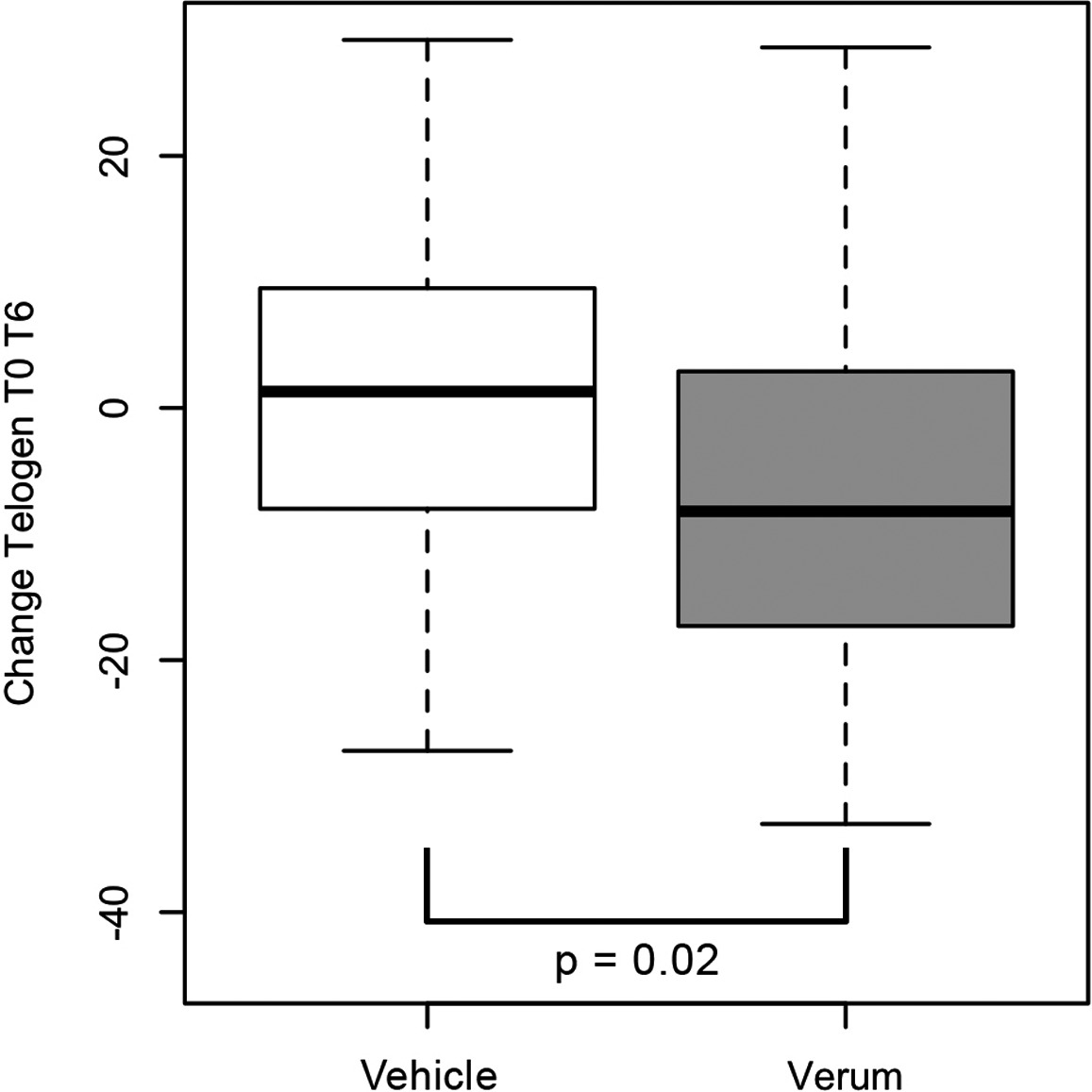
What’s Our Take On The Data?
Clearly there is a lack of research on the use of collagen supplementation in any form for hair loss of any kind. This large gap in the available evidence makes it difficult to ascertain if collagen supplementations would have a meaningful effect on conditions like alopecia areata, telogen effluvium and androgenic alopecia.
We know a clear pathology exists in androgenic alopecia in which collagen-producing fibroblasts become senescent (old cells) and start to build on the preexisting extracellular matrix in such a way that it becomes fibrotic tissue.
At the same time, it’s very possible that for conditions like AGA, we may actually need less collagen and more collagen degradation support. Because no matter how much collagen one takes, if the old, damaged collagen isn’t broken down (by a class of enzymes called MMP), remodeling cannot occur.
What is clear, is that the evidence for the use of collagen to ameliorate the aging process for general skin health is pretty strong. There truly is a benefit to consuming collagen supplements in any form really, for anti-aging of the skin.
It’s possible that by increasing collagen production and improving the way the collagen builds, the resulting improvements to our skin and the ECM could have a positive effect on our hair follicles.
Anecdotes in our forum regarding the carnivore diet (heavy on collagen) and successful hair regrowth seem promising. One of the key features of this diet is the reduction of damage to the ECM following increased consumption of foods rich in collagen.
Further, carbohydrate consumption is close to nil on the carnivore diet, resulting in a massive reduction in the glycation of collagen. (Glycation is the attachment of a sugar to protein) This prevents the most common source of damage to the ECM in the first place.
Hopefully, scientific inquiry will soon catch up to personal experimentation.
Based On The Evidence
Collagen responses are very different depending on hair loss type. So based on the current evidence, we believe there may or may not be a benefit to consuming collagen supplements.
That said, consuming sufficient collagen daily doesn’t hurt, especially to counteract age-related collagen loss.

Rob English is a researcher, medical editor, and the founder of perfecthairhealth.com. He acts as a peer reviewer for scholarly journals and has published five peer-reviewed papers on androgenic alopecia. He writes regularly about the science behind hair loss (and hair growth). Feel free to browse his long-form articles and publications throughout this site.
References
| ↑1 | https://www.ncbi.nlm.nih.gov/pmc/articles/PMC2818774/ |
|---|---|
| ↑2 | https://parjournal.net/article/view/3863 |
| ↑3 | https://dmsjournal.biomedcentral.com/articles/10.1186/s13098-018-0311-z |
| ↑4 | https://www.ncbi.nlm.nih.gov/pmc/articles/PMC6348462/ |
| ↑5 | https://www.ncbi.nlm.nih.gov/pmc/articles/PMC8126805/ |
| ↑6 | https://onlinelibrary.wiley.com/doi/10.1111/ijd.15518 |
| ↑7 | https://pubmed.ncbi.nlm.nih.gov/26362110/ |
| ↑8 | https://www.ncbi.nlm.nih.gov/pmc/articles/PMC5183725/ |
| ↑9 | https://onlinelibrary.wiley.com/doi/10.1111/jocd.14158 |

